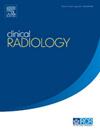Local trainee assessment: insights from a UK national survey of radiology training programme directors
IF 1.9
3区 医学
Q2 RADIOLOGY, NUCLEAR MEDICINE & MEDICAL IMAGING
引用次数: 0
Abstract
Aim
Clinical radiology training in the UK follows the competency-based model of medical education, which holds trainee assessment as a core component in providing evidence of progress and the capability to work independently upon completion. The training curriculum published by the Royal College of Radiologists defines a set of competencies and a framework of assessment for these purposes. Nonetheless, it is postulated that many training schemes also employ additional locally-administered assessments of their trainees, which are not described in the training curriculum. This study aims to explore the extent, purpose, and validation of such assessments within UK radiology training programmes.
Materials & methods
An electronic survey was distributed to clinical radiology training programme directors and heads of schools, using multiple choice and free-text questions. Responses were analysed qualitatively.
Results
29 responses were received, representing 17 out of 20 Local Training and Education Boards. 88% reported employing local assessments, with 53 individual assessments described overall. These primarily involved trainees in the initial years of training (ST1-2), aimed at authorising independent reporting (68%). The majority were found to be summative in nature, with performance affecting progression, on-call eligibility and often requiring resitting. Formal evaluation or audit processes for these assessments were absent in 40% of training schemes.
Conclusion
Despite their prevalence and perceived value amongst trainers, the absence of robust evaluation and published evidence raises questions as to their validity and fairness. The study highlights the need for further investigation and guidance for their implementation locally in radiology training schemes.
本地受训人员评估:来自英国全国放射学培训项目主管调查的见解
英国的临床放射学培训遵循以能力为基础的医学教育模式,将学员评估作为提供进步证据和完成独立工作能力的核心组成部分。皇家放射科医师学院发布的培训课程为这些目的定义了一套能力和评估框架。尽管如此,据推测,许多培训计划还对受训人员进行当地管理的额外评估,这在培训课程中没有说明。本研究旨在探讨英国放射学培训计划中此类评估的范围、目的和有效性。材料,方法向临床放射学培训项目主任和学校校长发放电子调查问卷,采用多项选择和自由文本问题。对反馈进行定性分析。结果收到29份回应,代表20个地方培训和教育委员会中的17个。88%的人报告采用地方评估,整体描述了53个单独的评估。这些主要涉及培训最初几年的受训人员(ST1-2),旨在授权独立报告(68%)。大多数被发现是总结性的,表现影响进步,随叫随到的资格,经常需要重新考虑。40%的培训计划缺乏对这些评估的正式评价或审核程序。尽管它们在培训师中很流行,也很有价值,但缺乏可靠的评估和公开的证据,这使人们对它们的有效性和公平性产生了疑问。这项研究强调需要进一步的调查和指导,以便在当地实施放射学培训计划。
本文章由计算机程序翻译,如有差异,请以英文原文为准。
求助全文
约1分钟内获得全文
求助全文
来源期刊

Clinical radiology
医学-核医学
CiteScore
4.70
自引率
3.80%
发文量
528
审稿时长
76 days
期刊介绍:
Clinical Radiology is published by Elsevier on behalf of The Royal College of Radiologists. Clinical Radiology is an International Journal bringing you original research, editorials and review articles on all aspects of diagnostic imaging, including:
• Computed tomography
• Magnetic resonance imaging
• Ultrasonography
• Digital radiology
• Interventional radiology
• Radiography
• Nuclear medicine
Papers on radiological protection, quality assurance, audit in radiology and matters relating to radiological training and education are also included. In addition, each issue contains correspondence, book reviews and notices of forthcoming events.
 求助内容:
求助内容: 应助结果提醒方式:
应助结果提醒方式:


